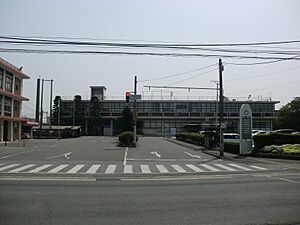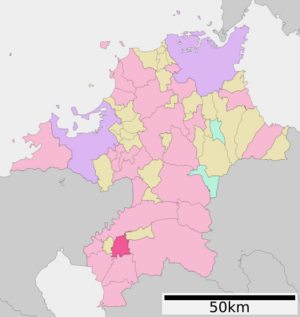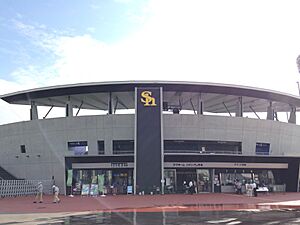Chikugo, Fukuoka facts for kids
Quick facts for kids
Chikugo
筑後市
|
|||||||||||
|---|---|---|---|---|---|---|---|---|---|---|---|

Chikugo city hall
|
|||||||||||
|
|||||||||||
 |
|||||||||||
| Country | Japan | ||||||||||
| Region | Kyushu | ||||||||||
| Prefecture | Fukuoka Prefecture | ||||||||||
| Area | |||||||||||
| • Total | 41.78 km2 (16.13 sq mi) | ||||||||||
| Population
(January 31, 2024)
|
|||||||||||
| • Total | 49,259 | ||||||||||
| • Density | 1,179.01/km2 (3,053.6/sq mi) | ||||||||||
| Time zone | UTC+09:00 (JST) | ||||||||||
| City hall address | 898 Oji Yamanoi, Chikugo-shi, Fukuoka-ken 833-8601 | ||||||||||
|
|||||||||||
Chikugo (筑後市, Chikugo-shi) is a city in Fukuoka Prefecture, Japan. As of January 31, 2024, about 49,259 people live here. The city is spread across 41.78 square kilometers. It is known for its beautiful natural areas and strong farming traditions.
Contents
Exploring Chikugo City
Chikugo is located in the middle of the Chikugo Plain. This area is in the southern part of Fukuoka Prefecture. You can reach Chikugo from Fukuoka City by train in about 45 minutes.
What's the Weather Like?
Chikugo has a humid subtropical climate. This means it has warm summers and cool winters. There is usually little to no snow. The average temperature for the year is about 15.8°C. September is the wettest month, with a lot of rain. August is the warmest month, averaging around 26.7°C. January is the coldest, with temperatures around 5.3°C.
How Many People Live Here?
The number of people living in Chikugo has changed over the years. Here's a look at the population based on Japanese census data:
| Historical population | ||
|---|---|---|
| Year | Pop. | ±% |
| 1960 | 40,479 | — |
| 1970 | 38,688 | −4.4% |
| 1980 | 41,698 | +7.8% |
| 1990 | 43,835 | +5.1% |
| 2000 | 47,348 | +8.0% |
| 2010 | 48,512 | +2.5% |
| 2020 | 48,827 | +0.6% |
A Look Back in Time
The area where Chikugo is now was once part of an old region called Chikugo Province. During the Edo Period (1603-1868), most of this land was controlled by the Fukuoka Domain. Smaller parts were under the Yanagawa Domain.
After the Meiji Restoration in 1868, Japan changed its local government system. On May 1, 1889, several villages were created. These included Hainuzuka, Mizuta, Shimotsuma, Futagawa, and Furukawa. Over time, some of these villages joined together.
On April 1, 1954, Hainuzuka, Mizuta, and Furukawa merged. This is how the city of Chikugo was officially formed.
What Drives the Economy?
The economy of Chikugo mainly depends on farming. Agriculture is a very important part of life and work in the city.
Learning in Chikugo
Chikugo has many schools for young people. The city government runs 11 public elementary schools and three public junior high schools. The Fukuoka Prefectural Board of Education operates two public high schools. There is also a special education school for students with disabilities. For higher education, the Kyushu Otani Junior College is located in Chikugo.
Getting Around Chikugo
You can travel in and out of Chikugo using trains and highways.
Railways
![]() JR Kyushu operates two important train lines:
JR Kyushu operates two important train lines:
- Kyushu Shinkansen: This is a high-speed bullet train line.
- Chikugo-Funagoya
- Kagoshima Main Line: This is a regular train line.
- JB Nishimuta - Hainuzuka - Chikugo-Funagoya
Highways
Major roads that pass through Chikugo include:
 Kyushu Expressway
Kyushu Expressway National Route 209
National Route 209 National Route 442
National Route 442
Places to Visit
Chikugo has some interesting spots to explore:
- Mizuta Tenmangū: A famous shrine.
- Sekijinsan Kofun: An ancient burial mound and a National Historic Site.
Famous People from Chikugo
- Ken Tanaka: A well-known actor.
See also
 In Spanish: Chikugo (Fukuoka) para niños
In Spanish: Chikugo (Fukuoka) para niños
 | Calvin Brent |
 | Walter T. Bailey |
 | Martha Cassell Thompson |
 | Alberta Jeannette Cassell |





